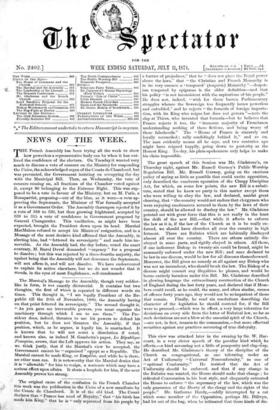The great speech of this Session was Mr. Gladstone's, on
Thursday night, against Mr. Russell Gurney's Public Worship Regulation Bill. Mr. Russell Gurney, going on the cautious policy of saying as little as possible that could excite opposition, only described the cumbrous operation of the Clergy Discipline Act, for which, on some few points, the new Bill is a substi- tute, stated that he knew no party in this matter except those who were willing to obey the law, and declared, amidst great cheering, that " the country would not endure that clergymen who were enjoying emoluments secured to them by the laws of their country, should be allowed to disobey the law." Mr. Gladstone pointed out with great force that this is not really in the least the drift of the new Bill,—that while it affects to enforce the law as it is, if the law of the Church as it is be really en- forced, we should have churches all over the country in high ferment. There are Rubrics which are habitually disobeyed almost all over the country. There are others entirely dis- obeyed in some parts, and rigidly obeyed in others. All these, if one indiscreet Bishop in twenty-six could be found, might be summarily enforced under the new Bill ; and once declared to be law in one diocese, would be law for all dioceses thenceforward. Moreover, the Bill gives no remedy at all against any Bishop who was not an incumbent, who should break the law. The Bishop of a diocese might commit any illegalities he pleases, and would be borne entirely harmless under this Bill. Mr. Gladstone described in glowing language the extraordinary resurrection of the Church of England during the last forty years, and declared that if Mem- bers could recall, as he could, the many, and often similar, causes of offence forty years ago, they would not be so impatient of those that remain. Finally, he read six resolutions describing the character of the legislation he should contend for, if the Bill were to proceed,—which was in effect, a very large toleration for deviations on every side from the letter of Rubrical law, so far as such deviations are not a blow at the essential spirit of the Church, —are not, in fact, treason to the communion,—but more effectual securities against any practices savouring of true disloyalty.


































